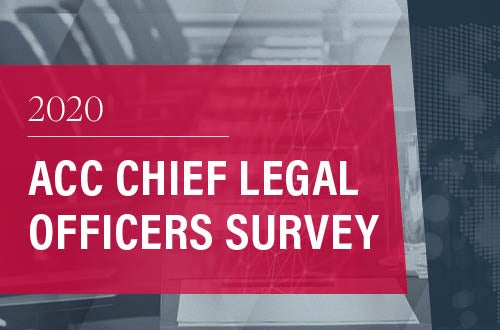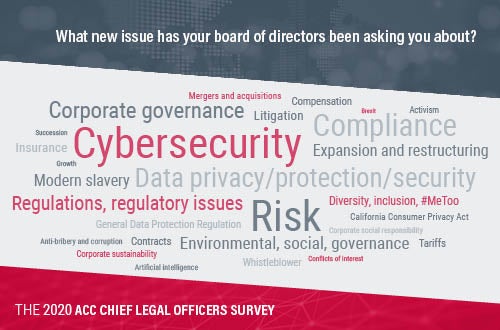

This year's edition of ACC's in-depth study of chief legal officers and general counsel builds on responses from 1,007 participants in organizations spanning 20 industries and 47 countries. The report contains four main sections:
The Legal Function Reimagined: A Closer Look At The ACC 2020 Chief Legal Officers Survey
By Mark A. Cohen
The 2020 Chief Legal Officers Survey represents the views of more than 1,000 chief legal officers and general counsel across a wide range of countries, industry sectors, and company types.
Participant organizations also vary substantially in terms of company revenue, size of the legal department, and amount of legal department spend.
participated in the survey
were represented
across seven global regions
Overall, the survey results indicate an increased influence of the CLO on the business across several indicators. Compared with 2019, a higher percentage of CLOs reports that executives and board members almost always seek its input based on five different measures. This positive trend is echoed by the highest number of respondents in five years that reports directly to the CEO — 80 percent. Additionally, more respondents than last year also serve as the corporate secretary, and the percentage of participants who hold the title of CLO has also increased by four points.
The legal department has a central position in the business with input, influence, and direct oversight of corporate functions that go well beyond legal matters, such as compliance, risk, and government affairs. Risk management is one such key area, with practically all surveyed legal departments being responsible for addressing legal risk. Furthermore, 62 percent of CLOs are often consulted on business risks, and about one-third weigh in on financial risks.
CLOs spend only one-third of their time on average providing legal advice while the rest of their work involves other business duties, such as contributing to strategy development, advising executives on nonlegal issues, and managing the legal department. CLOs need to “know the business inside and out,” and respondents ranked clear-cut business skills — leadership, business management, and executive presence — as the top three nonlegal skills that they seek to develop for in-house lawyers.
The results stress that cybersecurity and data privacy are two highly critical areas for both the legal department and the business overall. Almost 60 percent of CLOs surveyed believe that data privacy will pose the biggest legal challenges to organizations, and CLOs also consider it to be the issue that will require the most additional resources to address. Cybersecurity and data protection also topped the list of topics that board members asked CLOs about.
CLOs show interest in advancing the legal department’s work by adding new technology solutions to improve efficiencies but are also concerned about the trade-offs that technology adoption may involve. More than half are planning on adopting a new legal technology or have recently done so, and almost 70 percent think that the trend to use artificial intelligence in the legal department will accelerate. The concerns, however, are numerous and include facing upfront costs, new training needs for staff, and managing the added risks that digital transformation will entail.
Survey instrument: The survey questionnaire was offered through an online survey platform.
Fielding period: The survey opened on September 17, 2019, and closed on November 5, 2019. Reminder emails were sent weekly.
Target population: ACC members worldwide who are the highest-ranked legal officers in their respective legal departments. A screener question was asked to help determine the most relevant population.
Participation: A total of 1,007 GC and CLOs participated. Apart from targeted email messages, opportunities to participate were also sent through LinkedIn campaigns.
